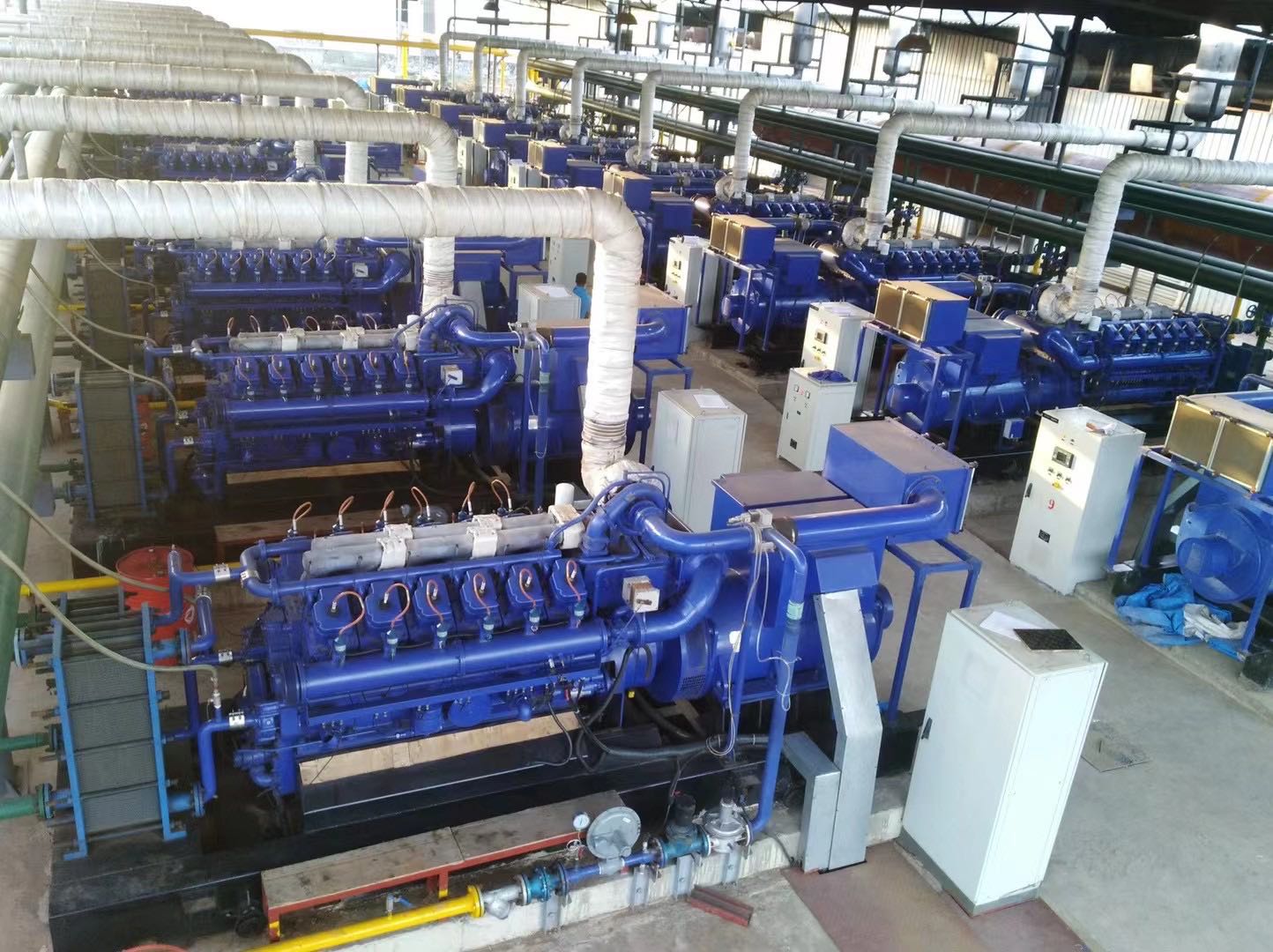 聯(lián)系 - 熱線
聯(lián)系 - 熱線

 聯(lián)系 - 熱線
聯(lián)系 - 熱線
解析700kW燃氣發(fā)電機組振動檢測方法
在能源轉(zhuǎn)換領(lǐng)域,700kW燃氣發(fā)電機組作為分布式發(fā)電的核心設(shè)備,其運行穩(wěn)定性直接關(guān)系到電網(wǎng)安全與能源利用效率。振動檢測作為機組健康管理的“聽診器”,通過捕捉機械運動的微妙變化,為預(yù)防性維護提供關(guān)鍵數(shù)據(jù)支撐。本文將深度解析燃氣發(fā)電機組振動檢測的技術(shù)體系,揭示其從原理到實踐的全鏈條價值。
In the field of energy conversion, the 700kW gas generator set, as the core equipment of distributed power generation, has a direct impact on the operational stability of the power grid safety and energy utilization efficiency. Vibration detection, as a "stethoscope" for unit health management, provides critical data support for preventive maintenance by capturing subtle changes in mechanical motion. This article will deeply analyze the technical system of vibration detection for gas generator sets, revealing its full chain value from principle to practice.
一、振動檢測的“生物仿生學(xué)”啟示
1、 The inspiration of "biomimetics" in vibration detection
燃氣發(fā)電機組的振動特性與生物體征存在驚人相似性:
There is a striking similarity between the vibration characteristics and biological features of gas-fired generator sets:
基頻振動:如同心跳信號,反映機組整體運行狀態(tài);
Fundamental frequency vibration: Like a heartbeat signal, it reflects the overall operating status of the unit;
諧波振動:類似呼吸頻率,揭示部件間的動態(tài)耦合;
Harmonic vibration: similar to respiratory frequency, revealing dynamic coupling between components;
沖擊脈沖:猶如咳嗽反射,預(yù)警突發(fā)機械故障。
Shock pulse: like a cough reflex, warning of sudden mechanical failure.
現(xiàn)代振動檢測技術(shù)借鑒生物醫(yī)學(xué)工程理念,通過多參數(shù)融合分析構(gòu)建機組“健康畫像”。這種仿生檢測思維,使振動分析從單一參數(shù)監(jiān)測升級為系統(tǒng)級狀態(tài)評估。
Modern vibration detection technology draws on the concept of biomedical engineering and constructs a "health profile" of the unit through multi parameter fusion analysis. This biomimetic detection thinking upgrades vibration analysis from single parameter monitoring to system level state evaluation.
二、檢測技術(shù)的“三維矩陣”
2、 The "3D Matrix" of Detection Technology
1. 傳感器技術(shù):從接觸式到非接觸式的進化
1. Sensor Technology: Evolution from Contact to Non Contact
接觸式測量:
Contact measurement:
電渦流傳感器:通過電磁感應(yīng)原理,實現(xiàn)亞微米級位移檢測,特別適用于軸承振動監(jiān)測;
Eddy current sensor: using electromagnetic induction principle to achieve sub micron displacement detection, especially suitable for bearing vibration monitoring;
加速度計:采用壓電晶體或MEMS芯片,捕捉高頻振動沖擊,頻響范圍可達20kHz。
Accelerometer: using piezoelectric crystals or MEMS chips to capture high-frequency vibration impacts, with a frequency response range of up to 20kHz.
非接觸式測量:
Non contact measurement:
激光測振儀:利用多普勒效應(yīng),實現(xiàn)遠距離、非侵入式檢測,空間分辨率達0.01mm;
Laser vibrometer: utilizing the Doppler effect to achieve long-distance, non-invasive detection with a spatial resolution of 0.01mm;
聲發(fā)射傳感器:通過捕捉材料裂紋擴展時的應(yīng)力波,實現(xiàn)早期故障預(yù)警。
Acoustic emission sensor: By capturing stress waves during material crack propagation, early fault warning can be achieved.
2. 信號處理技術(shù):從時域到頻域的穿透
2. Signal processing technology: penetration from time domain to frequency domain
時域分析:直接觀測振動幅值隨時間變化,識別撞擊、摩擦等瞬態(tài)事件;
Time domain analysis: directly observing the variation of vibration amplitude over time, identifying transient events such as impact and friction;
頻域分析:通過FFT變換將時域信號轉(zhuǎn)換為頻譜,揭示齒輪嚙合頻率、軸承故障特征頻率等關(guān)鍵信息;
Frequency domain analysis: By using FFT transform to convert time-domain signals into frequency spectra, key information such as gear meshing frequency and bearing fault characteristic frequency can be revealed;
時頻分析:采用小波變換技術(shù),同時獲取時域波形與頻譜特征,精準(zhǔn)定位故障發(fā)生時刻。
Time frequency analysis: Using wavelet transform technology to simultaneously obtain time-domain waveform and spectral characteristics, accurately locate the time of fault occurrence.
3. 智能診斷技術(shù):從經(jīng)驗判斷到數(shù)據(jù)驅(qū)動的躍遷
3. Intelligent diagnostic technology: a transition from empirical judgment to data-driven approach
系統(tǒng):內(nèi)置燃氣輪機故障特征庫,通過模式匹配實現(xiàn)初步診斷;
Expert system: Built in gas turbine fault feature library, achieving preliminary diagnosis through pattern matching;
機器學(xué)習(xí):利用SVM、隨機森林等算法,建立振動信號與故障類型的非線性映射;
Machine learning: using SVM, random forest and other algorithms to establish a nonlinear mapping between vibration signals and fault types;
深度學(xué)習(xí):通過CNN網(wǎng)絡(luò)自動提取振動波形深層特征,實現(xiàn)故障的早期識別與分類。
Deep learning: Automatically extracting deep features of vibration waveforms through CNN networks to achieve early recognition and classification of faults.

三、檢測實施的“黃金標(biāo)準(zhǔn)”
3、 The 'gold standard' for testing implementation
1. 測點布置:遵循“三線五點”法則
1. Measurement point layout: follow the "three lines and five points" rule
軸向布置:在驅(qū)動端與非驅(qū)動端軸頸處設(shè)置測點,監(jiān)測軸系對中狀態(tài);
Axial arrangement: Set measuring points at the necks of the drive and non drive ends to monitor the alignment status of the shaft system;
徑向布置:在軸承座、機殼中部、缸體連接處布置傳感器,捕捉結(jié)構(gòu)振動傳遞路徑;
Radial arrangement: Sensors are arranged at the connection between the bearing seat, the middle of the casing, and the cylinder body to capture the transmission path of structural vibration;
特殊測點:在燃氣進氣歧管、排氣擴壓段設(shè)置加速度計,監(jiān)測氣流激振。
Special measuring points: Install accelerometers in the gas intake manifold and exhaust diffuser section to monitor airflow excitation.
2. 檢測周期:構(gòu)建“三級檢測體系”
2. Testing cycle: Build a "three-level testing system"
日常巡檢:采用便攜式振動分析儀,每小時記錄關(guān)鍵測點振動總值;
Daily inspection: Portable vibration analyzer is used to record the total vibration value of key measuring points every hour;
定期精檢:每月進行頻譜分析,更新機組健康基準(zhǔn)線;
Regular precision inspection: Conduct monthly spectrum analysis and update the health baseline of the unit;
專項檢測:在大修前后實施模態(tài)分析,驗證結(jié)構(gòu)動力學(xué)特性。
Special testing: Conduct modal analysis before and after major repairs to verify the structural dynamic characteristics.
3. 數(shù)據(jù)解析:執(zhí)行“四步診斷流程”
3. Data parsing: execute the "four step diagnostic process"
趨勢分析:繪制振動烈度趨勢圖,識別劣化軌跡;
Trend analysis: Draw a vibration intensity trend chart to identify degradation trajectories;
頻譜解構(gòu):分解各階振動分量,定位故障源部件;
Spectrum deconstruction: Decompose the vibration components of each order and locate the faulty components;
相位分析:通過多通道相位測量,判斷不平衡、不對中類型;
Phase analysis: Determine the type of imbalance and misalignment through multi-channel phase measurement;
包絡(luò)分析:提取高頻沖擊信號,診斷軸承、齒輪早期損傷。
Envelope analysis: Extract high-frequency impact signals to diagnose early damage to bearings and gears.
本文由熱解氣發(fā)電機組友情奉獻.更多有關(guān)的知識請點擊:http://www.asianelephant.cn我們將會對您提出的疑問進行詳細的解答,歡迎您登錄網(wǎng)站留言.
This article is a friendly contribution from the analysis of gas generator sets For more information, please click: http://www.asianelephant.cn We will provide detailed answers to your questions. You are welcome to log in to our website and leave a message
業(yè)務(wù)分類
Business classification產(chǎn)品推薦
product recommendation聯(lián)系方式
Contact Information
聯(lián)系我們
contact us
 公司地址:山東省濟南市章丘區(qū)龍山街道潘王路24239號(龍山工業(yè)園八號路)
公司地址:山東省濟南市章丘區(qū)龍山街道潘王路24239號(龍山工業(yè)園八號路)
關(guān)注公眾號

企業(yè)二維碼

截屏,微信識別二維碼